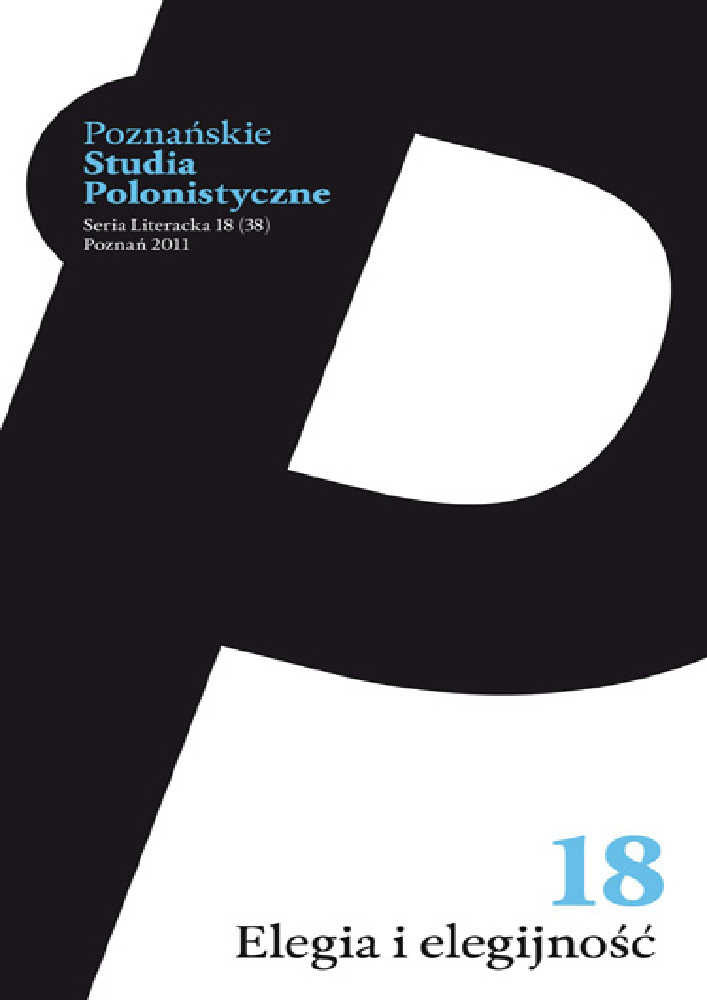Abstrakt
The question that this is article is concerned to answer is how the position of the film elegy can be best formally established — with its artistic representations, as well as its functioning in the genology of the genre. An attempt to provide definitive answers that emerge from interdisciplinary, film and literary discourse brings a number of substantial threads. Firstly, there is, indeed, no theoretical description of the elegy as a film genre, though the very name does appear in many titles. Secondly, it seems that a juxtaposition of available examples of film ad-aptations of elegies does not lead to any consistent conclusion, since, apart from the suggestion proposed by the author, they are different in terms of formal and thematic elements involved. Thirdly, any attempt at a genological profiling has to, somehow, refer to a more or less fixed literary genre and the relevant theory behind it. In a most general way, one can state, albeit with a number of reservations, that the elegiac film is characterized by a distinguishable style, often simply called the elegiac style, and the theme, very broadly associated with time and the theme of passing.
Bibliografia
Bayley J., Iris, przeł. K. Bogucka-Krenz, Warszawa 2002.
Helman A., Problemy interpretacji dzieł filmowych, w: Interpretacja dzieła, red. M. Czerwiński, Wrocław 1987.
„Filmowy Serwis Prasowy” 1979, nr 19.
Gijsen M., Elegia na śmierć Agnes, przeł. A. Wojtaś, Warszawa 1980.
Hendrykowski M., Ballada filmowa [hasło], w: Leksykon gatunków filmowych, Poznań–Wrocław 2001.
Hendrykowski M., Gatunek filmowy [hasło], w: Leksykon gatunków filmowych, Poznań–Wrocław 2001.
Kuczyńska-Koschany K., Skarga, roślina wiecznie zielona, w: Rycerz i Śmierć. O „Elegiach duinejskich” Rainera Marii Rilkego, Gdańsk 2010.
Legeżyńska A., Gest pożegnania. Szkice o poetyckiej świadomości elegijno-ironicznej, Poznań 1999.
Miczka T., Gatunek [hasło], w: Słownik pojęć filmowych, t. 10, red. A. Helman, Kraków 1998, s. 43–91.
Opacki I., Odwrócona elegia („Na sprowadzenie prochów Napoleona” Juliusza Słowackiego), w: Odwrócona elegia. O przenikaniu się postaci gatunkowych w poezji, Katowice 1999.
Ożóg J.B., Elegia, w: Elegia weselna i inne opowiadania, Warszawa 1977.
Rutkowska T., Ballada filmowa – czyli o „powrotach, które trwają w nieskończoność”, w: Sztuka na wysokości oczu. Film i antropologia, red. Z. Benedyktowicz, D. Palczewska, T. Rutkowska, Warszawa 1991.
Semczuk M., Elegia [hasło], w: Słownik literatury polskiej XX wieku, red. A. Brodzka et al., Wrocław 1992.
Sławiński J., Elegia [hasło], w: Słownik terminów literackich, red. J. Sławiński et al., Wrocław 1998.
Tomow A. Elegia dla ptaków, przeł. L. Bardijewska, Warszawa 1989.
Tudor A., Metoda krytyczna: autorzy i gatunki, przeł. J. Mach, „Kino” 1976, nr 3.
Licencja
Autorzy
Autorzy tekstów przyjętych do publikacji w czasopiśmie „Poznańskie Studia Polonistyczne. Seria Literacka” są zobowiązani do wypełnienia, podpisania i odesłania na adres redakcji umowy o udzielenie nieodpłatnej licencji do utworów, z zobowiązaniem do udzielania sublicencji CC.
Zgodnie z umową, autorzy tekstów opublikowanych w czasopiśmie „Poznańskie Studia Polonistyczne. Seria Literacka” udzielają Uniwersytetowi im. Adama Mickiewicza w Poznaniu niewyłącznej i nieodpłatnej licencji oraz zezwalają na użycie sublicencji Creative Commons Attribution-NoDerivatives 4.0 International (CC BY-ND 4.0).
Autorzy zachowują prawa do dalszego, swobodnego rozporządzania utworem.
Użytkownicy
Zainteresowani użytkownicy internetu uprawnieni są do korzystania z utworów opublikowanych od 2016 roku w „Poznańskich Studiach Polonistycznych. Serii Literackiej” pod następującymi warunkami:
- uznanie autorstwa – obowiązek podania wraz z rozpowszechnionym utworem, informacji, o autorstwie, tytule, źródle (odnośniki do oryginalnego utworu, DOI) oraz samej licencji;
- bez tworzenia utworów zależnych – utwór musi być zachowany w oryginalnej postaci, nie można bez zgody twórcy rozpowszechniać np. tłumaczeń, opracowań.
Do wszystkich tekstów opublikowanych przed 2016 r. prawa autorskie są zastrzeżone.
Inne
Uniwersytet im. Adama Mickiewicza w Poznaniu zachowuje prawo do czasopisma jako całości (układ, forma graficzna, tytuł, projekt okładki, logo itp.).
